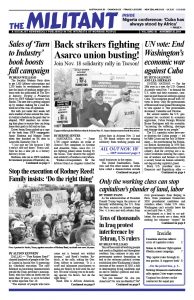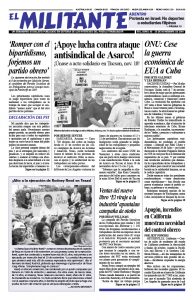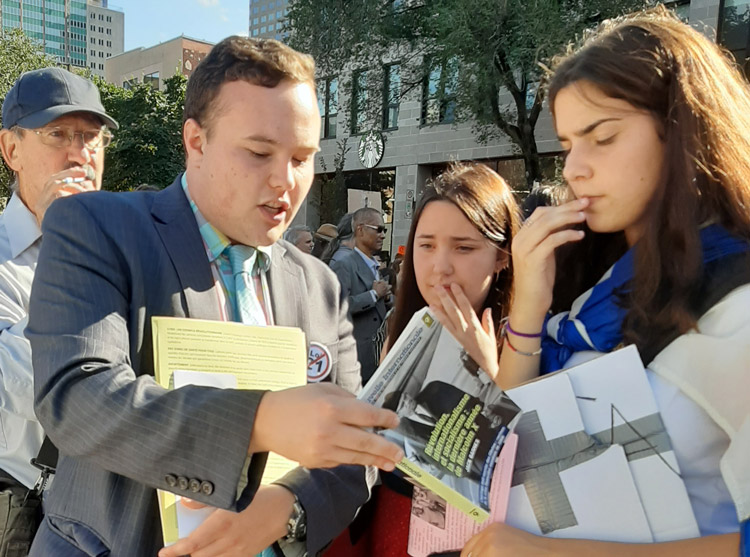MONTREAL — “The outcome of the Oct. 21 Canadian federal elections further deepened the crisis of Canada’s capitalist rulers,” explained Steve Penner at the Nov. 2 Militant Labor Forum here. “It puts them into an even weaker position to implement policies that address their deep-rooted problems.”
Penner was one of the two Communist League candidates in the Montreal area. He ran in the Papineau riding and Pierre-Luc Filion in Longueuil-St. Hubert.
The Liberal Party of Prime Minister Justin Trudeau remains in government, but lost its majority in parliament. It got fewer votes than any governing party in Canadian history and fewer votes than the opposition Conservative Party, but more seats. The Liberals cannot pass legislation without getting votes from at least one of the other parties, the Conservatives, the Bloc Quebecois or the New Democratic Party.
The capitalist crisis is rooted in the downward curve of world capitalism that began in the mid-1970s as a result of the falling profit rate of capitalist corporations, Penner said. It has led to sharpening rivalry among the world’s capitalist powers as they attempt to strengthen their own position against each other.
“Canada’s ruling families are far too weak compared to the world’s biggest capitalist countries,” Penner said. “They have no choice but to attach themselves to the U.S. capitalists’ coattails and support their imperialist foreign policy from the Middle East to Cuba and Venezuela in the hope that Washington will reward them.
“The fact that Donald Trump unilaterally ripped up the North American Free Trade Agreement with Canada and Mexico and imposed a new trade pact on both countries shows how little success Ottawa is having with that ‘strategy’” Penner said. The new pact has yet to be approved by either Ottawa or Washington.
“Canada’s rulers also need a strong central government to push back working-class resistance, which will inevitably become a threat to their rule as the capitalist crisis deepens,” Penner said. “But a strong federal government is exactly what they don’t have.”
The Liberal and Conservative parties both won votes from across the country in previous elections, but this time the former got support largely from the east and the latter largely from the west. All but one of the 48 seats in Alberta and Saskatchewan went to the Conservatives. The New York Times attributed the decline of Trudeau’s support in mineral-rich western Canada to his imposition of taxes on the use of fossil fuels and his “sanctimonious” attempt to “impose public morality.”
Aurelie McBrearty asked Penner why access to abortion wasn’t addressed during the campaign other than by the Communist League.
Penner explained that parties on the left of capitalist politics made a big issue of Conservative leader Andrew Scheer’s personal opposition to abortion. “That was just a cover for the fact that the real issue is the lack of access to abortion for millions of women across Canada, especially in rural areas, the Atlantic provinces and the north.” Less than one in five hospitals in Canada provide abortion services.
Penner said women’s rights groups “follow a lesser evil policy of trying to elect so-called friends of women’s rights, mainly the Liberals and NDP.
“But the right to abortion was won by thousands fighting in the streets to decriminalize abortion, not by voting for bourgeois parties.” The unions should fight for a woman’s right to choose abortion, he said.
Workers need their own party
“Workers need to break from the lesser evil policies also shared by the union officials, and fight independently of the bosses’ parties and build a fighting labor party.
“That’s the burning question facing Canadian National Railway workers who voted over 99% to strike,” Penner said. They have been without a contract since July. But rail union leaders postponed a strike until after the elections. Instead, they supported the “Anybody but Scheer” campaign of the trade union bureaucracy. Their focus is now on working with the Liberals in its efforts to “make the minority government work.”
“But it’s a capitalist government,” Penner pointed out. “It will only work in the interests of the small handful of wealthy families whose interests it serves, not those of working people.”
The same day as the forum, Communist League member Katy LeRougetel spoke in Toronto with a retired mechanic, Rudolph Terrelange, while campaigning. He said he voted for the Liberals, because Trudeau said that “he was protecting workers, making sure they wouldn’t be out of a job,” when the prime minister intervened to stop the prosecution of bosses at SNC-Lavalin who were accused of offering bribes.
LeRougetel answered, “He was just trying to hoodwink us. Trudeau defends big business, not working people. We need our own party, a labor party that fights to overthrow capitalist rule and establish a government that will act in the interests of working people.”
Penner concluded, “The Communist League is building a party that participates in every struggle of the oppressed and exploited to advance a revolutionary strategy, the only course that can win lasting gains.” During the campaign CL candidates joined the picket line of striking steelworkers, a rally against Ankara’s attack on the Kurds in Syria and an action against Quebec’s Law 21, which bans teachers and other public sector workers wearing religious symbols.
He invited forum participants to join the League in its activities and to join the party. “There is nothing more worthwhile you can do with your life.”


